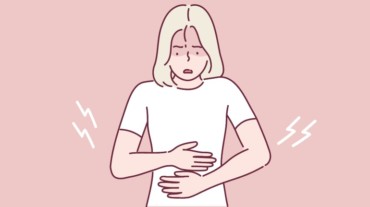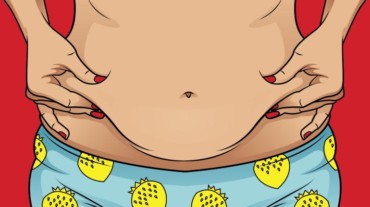
“Am I just bloated or is my belly fat prompting me to up my workout and diet game?”. This question haunts every woman—especially before she’s about to slip into a skimpy dress that promises to highlight her curves—ALL the curves, we mean. Yes, even that of her belly bulge.
If you too happen to face this problem in life, we know exactly how these mixed signals from the body can be super-confusing and make it difficult for you to decide the right plan of action to tackle the problem. But, not anymore.
This has got to stop right here, right now as we’re about to unveil just the right way of figuring out whether your bigger belly is a result of bloating or fat accumulation. Here’s how you can differentiate between the two pain-in-the-rear problems:
What exactly are these two problems even?
Belly fat
“Belly fat is usually something that develops over a period of time and stays longer as well. It occurs when you are consuming more calories than required and settles around the organs, especially the lower belly,” points out Preety Tyagi, nutritionist, health coach, and co-founder, My22BMI, a health and wellness services company.
Bloating
“Bloating is an occasional ballooning or swelling up of the stomach that usually happens due to gas build-up/water retention post-consumption of certain foods,” she adds.
So what causes these problems?
Belly fat
Tyagi attributes belly fat to the following causes:
Bloating
As for bloating, she says: “Bloating can be caused after eating foods that are hard to digest or cause gas during digestion. Poor digestion and the incapability to break down these foods can fill up the gastrointestinal tract with air or gas.”
“Lactose intolerance (the inability to digest milk/dairy products) is also a major cause of bloating,” she adds.
Select Topics of your interest and let us customize your feed.
PERSONALISE NOWNot to mention, bloating could be a side-effect of certain medications or just an underlying health problem such as Irritable Bowel Syndrome (IBS), constipation, bacterial infection, etc. In fact, you could be bloated due to excessive water retention if you’re going through a bad pre-menstrual syndrome (PMS) or simply if you’ve had too much sodium from salt/preserved foods.
These symptoms can help you identify the real villain
By now you’re probably clear about how bloating and belly fat are two entirely different problems. Unfortunately, though, their similar effects can still stir up some confusion. But, these symptoms can help you identify whether you’re just bloated or it is belly fat.
Belly fat
This is basically fat accumulation inside the abdominal cavity. Hence, the most common sign would be a noticeable increase in the size of your belly bulge over time. In case you’ve been overeating, living a sedentary lifestyle, and not exercising every day, you can be certain that the cause of your misery is belly fat, that has accumulated over time because of your poor lifestyle.

If ignored, belly fat can make your life worse. “It is associated with a higher risk of heart disease, hypertension, insulin resistance, and type 2 diabetes. It also involves a high risk of heart attacks, asthma, and many more health issues,” Tyagi warns.
Bloating
As for bloating, she says,“Bloating can be caused after eating foods that are hard to digest or cause gas during digestion. Poor digestion and the incapability to break down these foods can fill up the gastrointestinal tract with air or gas.”
“Lactose intolerance (the inability to digest milk/dairy products) is also a major cause of bloating,” she adds.
Not to mention, bloating could be a side-effect of certain medications or just an underlying health problem such as Irritable Bowel Syndrome (IBS), constipation, bacterial infection, etc. In fact, you could be bloated due to excessive water retention if you’re going through a bad pre-menstrual syndrome (PMS) or simply if you’ve had too much sodium from salt/preserved foods.
Also, Read: Here’s a crash course on prebiotics to keep your gut healthy and happy
How can you combat these problems?
Now that you know what the real problem is, you can try out these expert-recommended ways to combat the issue:
Belly fat:
Bloating:
Now that you know, make healthy decisions and get fit.
Get Latest Updates on Preventive Care, Family Care, Reproductive Care, Self Care